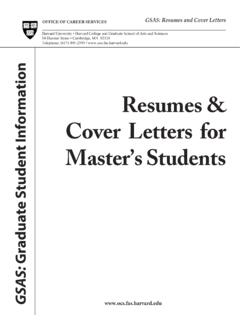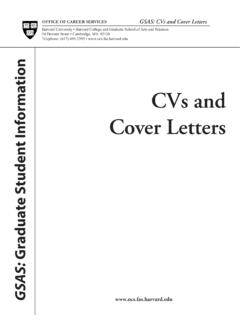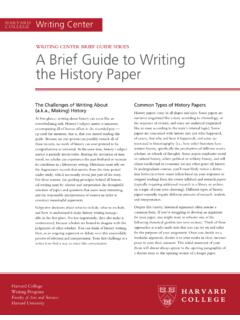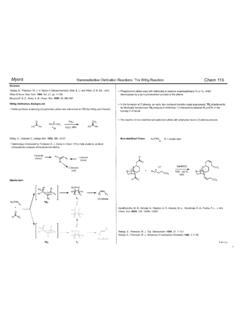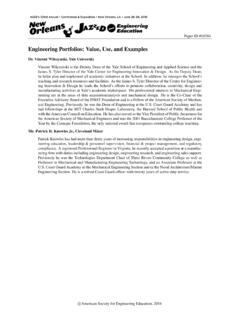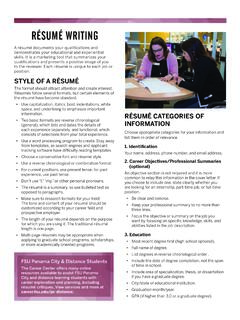Transcription of Resumes & Cover Letters for Student PhD Students Graduate
1 OFFICE OF CAREER SERVICES GSAS: Resumes and Cover Letters Harvard University Harvard College and Graduate School of Arts and Sciences 54 Dunster Street Cambridge, MA 02138 Telephone: (617) 495-2595 Resumes & Cover Letters for PhD Students GSAS: Graduate Student Information 2021 Harvard University All rights reserved. No part of this publication may be reproduced in any way without the express written permission of the Harvard University Faculty of Arts & Sciences Office of Career Services.
2 8/21 Office of Career Services Harvard University Faculty of Arts & Sciences Cambridge, MA 02138 Phone: (617) 495-2595 1 When should I use a resume , and when should I use a CV? Think about who will be reading your resume . For academic jobs, you use a CV so that people in your field will appreciate the specifics of your research and your accomplishments within your field. If you re applying for a nonacademic job where people doing the hiring will have a background similar to your own say, a research institute, or a research position in industry then your academic CV is probably fine to use.
3 However, if you re applying for positions for which a PhD isn t necessarily required, or if you can t count on your reader's familiarity with your research, then you ll likely want to use a resume . For most non-research-oriented, non-academic jobs, you will want to use a resume . What is the difference between a CV and a resume ? A resume is typically shorter, 1-2 pages at most, and will dedicate more space to your experience while focusing less on academic awards, conference presentations, and publications.
4 Depending on your intended reader, you will likely go into less detail on the specifics of your research and teaching topics, but rather highlight the transferable and relevant skills you developed through this work. I m planning on applying to several different types of jobs. Will I be expected to write a different resume for each one? Again, it is important to think about your reader. Let s say you are receiving a PhD in applied physics, and you are applying for R&D jobs in industry, as well as for quantitative positions in investment banks, and generalist positions in big consulting firms.
5 You will want to have three different versions of your resume for these three fields. You might use a version of your academic CV for industry, though perhaps emphasizing practical applications of your research. The investment banks will be more interested in quantitative analysis skills, so you d want to be clear how you developed those skills in the course of your research. Consulting firms will be concerned with how you ve developed leadership and problem solving skills; in that case, you might include less detail about your research experience, but include more information about involvement with Student groups, volunteer work, or internships that may have allowed you to develop these skills.
6 A friend of mine, who is in business school, told me I need to have a one page resume . Is that true? It depends. If you are a doctoral candidate applying for jobs that require a PhD degree, or if you are being recruited because of your PhD, then having a two page resume is fine. However, if you will be applying for positions that do not require a PhD, then having a two page resume may send a signal that you re overqualified or otherwise not fitting the mold of a typical candidate for entry to mid-level jobs in business.
7 For BA/BS and MBA candidates, a one page resume is the norm. It is important to follow the directions of the employers. If they ask for a one page resume , be sure to submit what they ask for. When in doubt, ask one of the GSAS advisers at OCS. Are there formatting guidelines I should keep in mind? Stick to a common font like Times New Roman or Ariel, and avoid text boxes, underlining, or shading. Font size should be between 10 and 12 point, and kept consistent throughout the document. Margins should be equal all the way around the page, and should be at least half an inch in size.
8 Can someone at OCS review my resume ? Yes. Each semester the GSAS advisers hold weekly drop-in hours for GSAS Students interested in having their Resumes or CVs critiqued. Students may also have their Resumes reviewed as part of an advising appointment with a GSAS staff member (to schedule an appointment, visit the OCS website and follow the directions on Crimson Careers). Resumes and Cover Letters For PhD Students 2 Achievement Administrative Communication Creative Financial accelerated arranged addressed authored allocated accomplished channeled arbitrated changed analyzed achieved charted articulated conceived appraised activated collated briefed constructed audited attained collected communicated created balanced competed coordinated conducted developed budgeted earned dispensed contacted devised calculated effected distributed conveyed drafted compiled elicited
9 Established corresponded established computed executed executed delivered formulated controlled exercised implemented demonstrated founded disbursed expanded installed edited illustrated estimated expedited maintained entertained influenced figured generated offered interviewed introduced financed improved ordered informed invented forecasted increased outlined lectured launched projected insured performed mediated originated reconciled marketed prepared negotiated revamped tabulated mastered processed persuaded revised obtained provided presented staged Technical produced purchased promoted updated adapted reduced recorded proposed visualized adjusted reorganized rendered publicized applied reproduced served reported built restructured serviced represented computed simplified sourced responded Research/Analytical constructed sold supported suggested assessed designed solicited translated compared diagnosed streamlined Lead/Manage wrote critiqued engineered succeeded acquired defined experimented
10 Upgraded administered derived maintained approved Plan/Organize detected modified assigned allocated determined operated Help/Teach chaired anticipated discovered prescribed advised contracted arranged evaluated programmed clarified controlled catalogued examined proved coached decided categorized explored reinforced collaborated delegated classified found repaired consulted directed collected inspected resolved counseled enlisted consolidated interpreted restored educated governed convened investigated solved explained handled edited located specified facilitated initiated eliminated measured systematized guided instilled employed observed tested helped instituted gathered predicted instructed managed grouped rated modeled motivated monitored recommended participated presided organized researched taught recruited planned reviewed trained retained regulated searched tutored reviewed scheduled studied selected structured surveyed shaped summarized verified supervised targeted Consider describing your

